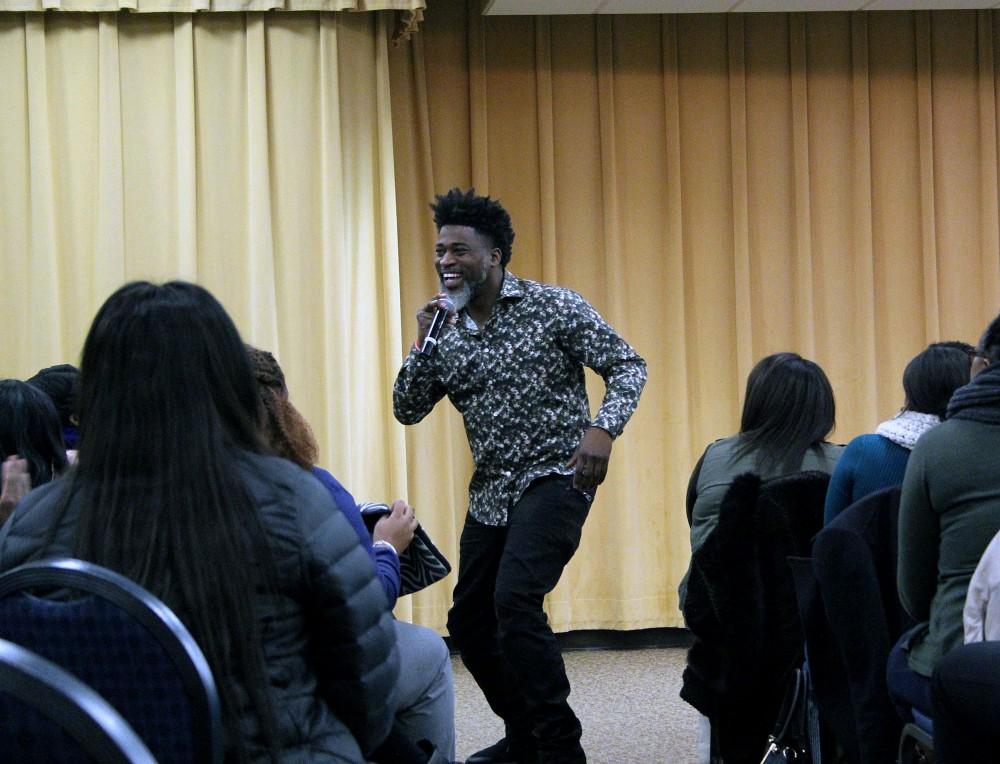David Banner brings new perspective to race discussions

GVL / Courtesy of Dan Goubert
Feb 22, 2016
Grammy award-winning music producer David Banner voiced a blunt request for silenced technology to begin his Feb. 15 lecture as part of Grand Valley State University’s Black History Month speaker series. This gesture set the evening’s theme of shifting perspectives on race.
“First thing I need you to do is put your damn phones down,” Banner said. “Let me tell you why. For all the black people in here: when the government is conspiring against you, (when) the police department is conspiring against you, you don’t see it on Twitter. You don’t see it on Facebook.
“Today, I’m going to say some things you might not agree with. To be honest with you, I say a lot of things that I don’t agree with. But the thing is, I’m only here to challenge the way you think. I don’t care what you think about me, I just want you to think.”
Those final two sentences became Banner’s mantra for the evening, as he repeated it several times during the lecture to encourage audience introspection. Brianna Pannell, president of GVSU’s Black Student Union, said this idea of independent thought was the event’s most important takeaway.
“The most important thing (students) could’ve taken away from the speech was basically the process of thinking and ascertaining information,” Pannell said. “Because Banner explained that what he was saying wasn’t fact and truth. It was more…’This is what I think, so I want you to go think about what I’m saying and then really see if there’s truth in it.’”
Banner, a philanthropist, activist and actor, interspersed jokes about family and music among the several weighty topics of his speech, which included religion, prejudice and white supremacy. One of Banner’s recurring talking points was the oppressive jadedness he sees within the black community, especially in regard to racial slurs.
“The truth is, most black people don’t like being black. Most black people see themselves through the eyes of white men,” Banner said. “In order for us to change that mindset, we have to really get into what hurting us.
“Because (slavery) hurt so bad, we had to make it something we could adjust to. The same way I adjust to all this pain by joking with you. But it ain’t a damn joke…you have an infinite amount of words you could call yourself. You could call yourself a god.”
Banner said that this problem of self-naming affected perceptions of him in the music industry. After rising to fame as a rapper in the early 2000s with songs like “Like a Pimp,” Banner said he has since grown to object to hip-hop’s often-detrimental language.
“When I called you n—–s and b—–s, I was No. 1 on the charts. But when I called you gods and goddesses, I got more criticism then I ever have in my life,” Banner said.
In his lecture, Banner went on to talk about problems with current treatment of black history, from posthumous mistreatment of Martin Luther King Jr. and Malcolm X to current views on President Barack Obama. Banner said that he is not the biggest proponent of Obama.
“I’m tired of dreams and hope,” Banner said. “Let me tell you why: You never hear white people talking about dreams and hope. Does the architect need hope? You know why the architect doesn’t need hope? Because he has the plan,” Banner said. “Black folks ain’t gotten s— out of Obama being president but a whole lot of hope.”
Banner ended his speech by proposing solutions for the black community. Banner said black people need to produce their own unique product, find a distribution system for it and support other black people by buying their product. Bobby Springer, associate director of multicultural affairs at GVSU, said this idea of beginning with the self was one of Banner’s most memorable messages.
“You have to believe in yourself. It starts with you,” Springer said. “We can’t worry about what the other person thinks or what this world believes, but we have to believe in ourselves. That’s the great motivator, is to have that confidence in yourself and believe you can be whoever you want to be.”






















